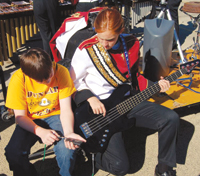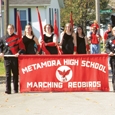.jpg)
The Metamora (Illinois) Township High School Parade and Field Invitational began in 1981 as a fundraiser for the band boosters and only included a few local bands. Since then it has grown into a large festival that attracts 25 to 30 marching bands per year from all parts of Illinois and a few bands from neighboring states. Bands range in size from 25 to 180 players, the majority of which have less than 100 members. Altogether the festival brings 5,000 to 6,000 band students, directors, staff, parents, and fans, more than doubling the town’s population of 3,000.
Because of our large facilities, many of the smaller area bands consider Metamora the most important event of the year. The football stadium is large enough to rival those of many small colleges, including a tall press box that gives judges a bird’s eye view of the field. Despite the large stadium, the school does not have much extra outdoor space for warmups, but there is a small field where bands can play and work on basic marching exercises without interfering with the performances.
Illinois does not have a statewide system of marching band competitions, so hosts have more options when planning a festival. However, the lack of standard hosting guidelines places more responsibility on individual schools to ensure that their events are well organized. Many of our ideas for the show came from attending other competitions, particularly Bands of America events, and seeing what worked well at those.
Judging
The judges include college band directors, drum corps personnel, and retired music educators. As with BOA events, each adjudicator gives scores that break each category down into several elements. This shows bands more specifically why they received their score and what they can do to improve. For example, music scores are given for the ensemble as a whole and for woodwinds, brass, and percussion individually. The ensemble score includes separate scores for tone quality and intonation, accuracy and definition, and musicality.
A good friend at Washington Community High School in Illinois gave me the idea for a director’s critique. Unlike the other judges’ comments, which are intended for the directors and students, the director’s critique is for his ears only. That judge does not assign a score but evaluates all elements of the show and suggests ways the band can improve. Directors are invited to sit with that judge during the performance.
Over the past few years many more shows include a clinic after the performance. The Phantom Regiment in Rockford, Illinois did an instant critique when we went to the first few shows they hosted, and we decided to go to as many shows as possible that offer critiques. The number of bands at our show makes it difficult to offer a full clinic to each group, but the director’s critique allows someone to comment on the overall show and offer candid thoughts.
Administration
Metamora’s administration, particularly the principal, the athletic director, and the maintenance crew, is quite supportive of the event. The principal welcomes the bands and remains for a good part of the day. He has to approve of my decision to move inside or stay out if bad weather is possible. The principal and athletic director usually end up in the judge’s meeting the morning of the competition and the judges are always shocked to see administrators at a marching band event.
 Volunteers
Volunteers
The 80 Metamora marching band students rely heavily on 150 volunteers who are primarily parents, former band parents, alumni, and friends of the program. Volunteers cook food, guide bands, monitor parking, take tickets, and stamp hands.
Bands are greeted by parents when the buses arrive to create a welcoming and festive atmosphere. The volunteers stamp the hands of everyone on the buses, even if there are parents or friends.
The local ham radio club has helped with many aspects of the competition since two of its members were band parents more than 20 years ago. The local operators need to log a certain number of hours for their license, so there is an incentive for them to help us. They do many little tasks that make the competition run smoothly. One stays with me the entire day, so if a student forgets a tuba mouthpiece or an entire horn they can locate me quickly and I can use a student to find a replacement. Another shadows the parent director.
The radio operators also manage traffic and watch for emergencies from their stations around the stadium. Licensed operators can communicate directly with the police and ambulances, so if a student or spectator passes out from the heat or twists an ankle, they can contact the authorities quickly.
The ham radio operators are also trained to monitor the weather. They can tell us if impending rain will pass quickly, continue all day, or become severe enough to threaten the safety of those in attendance. Illinois has a system called Thor that helps the radio operators. An alarm sounds whenever Thor detects conditions that are right for lightning. All outside school activities are required to move indoors after the alarm.
If weather moves the show inside, performances are in the gym. Each band is assigned a hallway based on its size to function as a homeroom. We do not use any classrooms. Winds and percussion warm up in the auditorium and a smaller gym is for guard warmup. Our policy on rain is that once we go in, it stays inside so the scoring is fairer. The hot, muggy gym is not ideal for performing, but fortunately we have not had to go inside in years.
Concessions
Concessions are another large operation. A parent food director lines up all the volunteers, makes the schedule, and orders the food. Our most popular item is the pork chop sandwich.
The parents are careful to maintain reasonable food prices. Many competitions charge high prices for food, but most students buy food from their own pockets so we keep prices as low as we can. We do this by paying attention to what sells well and what is easiest to make. We grill some items, but pre-packaged food requires less preparation and saves time. The festival brings about half of the booster income for the year, so we can afford to charge less for food without hurting our budget.
Parade
Prior to the show the bands are assigned a slot in the parade. The route is less than a mile, so it can be a good warmup before the field show. They march past the judging area while playing and receive scores on music, marching, and showmanship. We give separate awards for the parade in addition to the field awards, and the two grand champion trophies are given for the sum of both scores.
Some bands choose not to be in the parade. That takes them out of the grand champion running, but many have scheduling conflicts earlier in the day. Last year out of 32 bands only 6 missed the parade. Originally the parade would take place in the morning and the field show in the afternoon, but 10 years ago we changed to an afternoon parade and an evening field show. Many more bands came after that because students who have sports on Saturday morning or afternoon can still play in the field show.
The parade has become an important community event. About an hour before it starts many Metamora residents gather with lawn chairs and blankets to watch the bands pass the judges’ stand at the Metamora Historic Courthouse. The audience at the field show consists mainly of performers and their families, but the parade crowd is primarily village residents, many of whom eagerly look forward to the parade. When I go to the local grocery or pharmacy in the fall, people often ask me what time the parade starts, how many bands will be there, and if the weather forecast is promising.
The band boosters select a grand marshal for the event every year based on a connection to the Metamora band program, the school, or the community. In the past we have honored the mayor of Metamora, former drum majors, band booster presidents, Abraham Lincoln during the bicentennial of his birth, and a retiring superintendent. In 2009 we honored the Metamora football team. As grand marshals, the team’s co-captains rode in the parade and presented the grand champion trophies at the awards ceremony. It is a rare sight to see football players handing trophies to marching band drum majors, but these young men felt an enormous amount of pride in representing their school and their team.
Videos
Along with the judges’ sheets, bands go home with a CD containing recorded comments and a DVD of their show. We are looking for a way to make DVDs that synch the performance with the judges’ comments, but for now these are on separate discs.
Last year a professional video producer offered to make DVDs for us. He gave one free copy to each band director, and in exchange we would allow him to sell copies to students and parents. He brings all of his equipment to the site, so a band can perform and an hour later the DVD is available. The parents used to make a DVD for the band directors, but we never sold them.
Over time other vendors approached me about being at the festival. The Blue Stars Drum and Bugle Corps has a souvenir booth because we co-host a DCI show with the Blue Stars in the summer, and some military recruiters also have booths and give away free items. Someone sells flags and t-shirts and makes a donation to the band every year in return.
Participating bands are encouraged to offer suggestions to improve the festival. Comments often involve the judges, parking, and the schedule. I tightened the time between the parade and the field show after a colleague suggested that there was too much of a space.
After 30 years, we have expanded into hosting two other shows. The Metamora Concert Band Festival started five years ago and is a non-competitive festival where each band’s performance is followed by a clinic with regionally and nationally known composers and teachers. Two years ago, Metamora and the Blue Stars Drum and Bugle Corps began to co-host a DCI-sponsored show called River City Rhapsody.
I meet with the volunteers before the day begins and tell them that they are here because we want it to be a great experience. Competing is part of marching band, but my goal is to provide a solid educational experience to all our bands and participating students.





